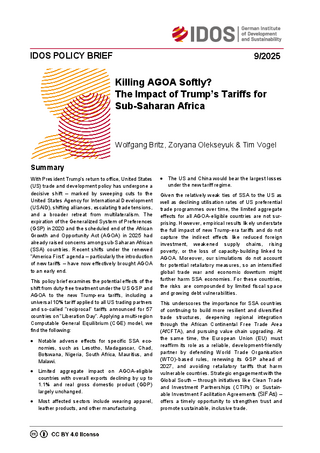Killing AGOA softly? The impact of Trump’s tariffs for Sub-Saharan Africa
Britz, Wolfgang / Zoryana Olekseyuk / Tim VogelPolicy Brief (9/2025)
Bonn: German Institute of Development and Sustainability (IDOS)
DOI: https://doi.org/10.23661/ipb9.2025
With President Trump’s return to office, United States (US) trade and development policy has undergone a decisive shift – marked by sweeping cuts to the United States Agency for International Development (USAID), shifting alliances, escalating trade tensions, and a broader retreat from multilateralism. The expiration of the Generalized System of Preferences (GSP) in 2020 and the scheduled end of the African Growth and Opportunity Act (AGOA) in 2025 had already raised concerns among sub-Saharan African (SSA) countries. Recent shifts under the renewed “America First” agenda – particularly the introduction of new tariffs – have now effectively brought AGOA to an early end.
This policy brief examines the potential effects of the shift from duty-free treatment under the US GSP and AGOA to the new Trump-era tariffs, including a universal 10% tariff applied to all US trading partners and so-called “reciprocal” tariffs announced for 57 countries on “Liberation Day”. Applying a multi-region Computable General Equilibrium (CGE) model, we find the following:
• Notable adverse effects for specific SSA eco-nomies, such as Lesotho, Madagascar, Chad, Botswana, Nigeria, South Africa, Mauritius, and Malawi.
• Limited aggregate impact on AGOA-eligible countries with overall exports declining by up to 1.1% and real gross domestic product (GDP) largely unchanged.
• Most affected sectors include wearing apparel, leather products, and other manufacturing.
• The US and China would bear the largest losses under the new tariff regime.
Given the relatively weak ties of SSA to the US as well as declining utilisation rates of US preferential trade programmes over time, the limited aggregate effects for all AGOA-eligible countries are not surprising. However, empirical results likely understate the full impact of new Trump-era tariffs and do not capture the indirect effects like reduced foreign investment, weakened supply chains, rising poverty, or the loss of capacity-building linked to AGOA. Moreover, our simulations do not account for potential retaliatory measures, so an intensified global trade war and economic downturn might further harm SSA economies. For these countries, the risks are compounded by limited fiscal space and growing debt vulnerabilities. This underscores the importance for SSA countries of continuing to build more resilient and diversified trade structures, deepening regional integration through the African Continental Free Trade Area (AfCFTA), and pursuing value chain upgrading. At the same time, the European Union (EU) must reaffirm its role as a reliable, development-friendly partner by defending World Trade Organisation (WTO)-based rules, renewing its GSP ahead of 2027, and avoiding retaliatory tariffs that harm vulnerable countries. Strategic engagement with the Global South – through initiatives like Clean Trade and Investment Partnerships (CTIPs) or Sustain-able Investment Facilitation Agreements (SIFAs) – offers a timely opportunity to strengthen trust and promote sustainable, inclusive trade.
PD Dr agr. Wolfgang Britz is a Senior Researcher and lecturer at the Institute for Food and Resource Economics, Bonn University.



